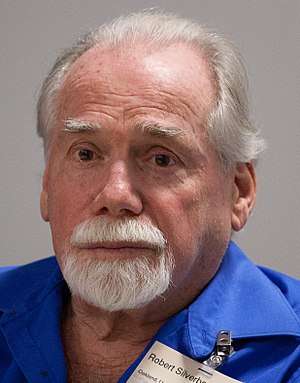Robert Silverberg

Robert Silverberg in 2009
Robert Silverberg is an enormously prolific science fiction and fantasy writer, and a winner of multiple Hugo and Nebula awards. Possibly his best-known work is the Majipoor sequence, beginning with the novel Lord Valentine's Castle.
His short story To See The Invisible Man was adapted for a 1980s episode of The Twilight Zone.
Robert Silverberg provides examples of the following tropes:
- Adaptation Expansion: In the early 1990s, for no readily apparent reason, he wrote novel-length expansions of three of Isaac Asimov's most famous short stories.
- Blind and the Beast: In "To See the Invisible Man", a man sentenced to a year of "societal" invisibility manages a brief conversation with a blind man, who ends up rejecting him just like everybody else.
- Brain In a Jar: in Nightwings
- Came Back Wrong: in Recalled to Life
- Care Bear Stare: in Lord Valentine's Castle
- Casual Time Travel: Deconstructed in "Needle in a Timestack"--with no system of Time Police, one narcissist with relationship issues manages to ruin a lot of lives.
- Death World: in Face of the Waters and Planet Of Death. Oh, dear Lord in Heaven, Planet Of Death.
- Demythtification: Gilgamesh the King
- Divided States of America: in "The Palace at Midnight"
- Dystopian Edict: in "To See The Invisible Man"
- Easy Amnesia: How It Was When The Past Went Away has three drugs that do this, varying in what part of the brain they wipe. A paranoiac dumps all three of them in the water supply of a major city as a way of taking revenge on the world around him, and winds up creating a blissful cult of people who drink to forget all their mistakes and frailties. (This is apparently supposed to be a good thing.)
- Equivalent Exchange: in The Time Hoppers, material objects can only travel to another time by swapping places with an equivalent mass.
- Expendable Clone: The Far Side of the Bell-Shaped Curve.
- Eyeless Face: Victor Farkas in Hot Sky at Midnight
- After the End: At Winter's End and The New Springtime
- A God I Am: "Flies", from Dangerous Visions. In the most horrifying way possible.
- Hollow World: Across A Billion Years
- Humans Are Ugly: According to the dolphin narrator of Ishmael in Love, anyway. And to the empathic super-baboons in At Winter's End and The New Springtime, we looked kind of like The Greys.
- Humans Through Alien Eyes: Or sometimes, through the eyes of dolphins or empathic super-baboons.
- Immortality Seeker: in The Book of Skulls
- Intelligent Gerbil: the Nildoror in Downward to the Earth
- No Transhumanism Allowed: Played in a minor note in The Great Conglomeroid Cocktail Party. Transhumanism itself isn't necessarily bad--what's bad is when those who have modified themselves start to look down on (and exploit) everyone else.
- Offered the Crown: Lord Valentine's Castle
- Planetary Romance: Majipoor
- Religious Robot: "Good News from the Vatican" is a satirical look at the election of the first robot Pope. Obviously to become Pope he'd have needed to spend years working his way up to cardinal.
- Ringworld Planet: a concave world, in Across a Billion Years
- Ripple-Effect-Proof Memory: in Up the Line
- Thank the Maker: in Tower of Glass
- Time Police: in Up the Line
- Too Dumb to Live: The Far Side of the Bell-Shaped Curve. The main character's right about being on the far side of that bell-shaped curve of intelligence, but not necessarily right about what side.
- Translation Convention: Explicitly pointed out in the foreword to Nightfall
- Vichy Earth: in The Alien Years
- The War of Earthly Aggression: in Revolt on Alpha C
- Water Source Tampering: In "When the Past Went Away", amnesia-inducing drugs are dumped in a city's water supply, leaving everybody in the city with no memory of who they are.
- Who Dunnit to Me?: in To Live Again
- Xenofiction: Played with a lot.
This article is issued from Allthetropes. The text is licensed under Creative Commons - Attribution - Sharealike. Additional terms may apply for the media files.